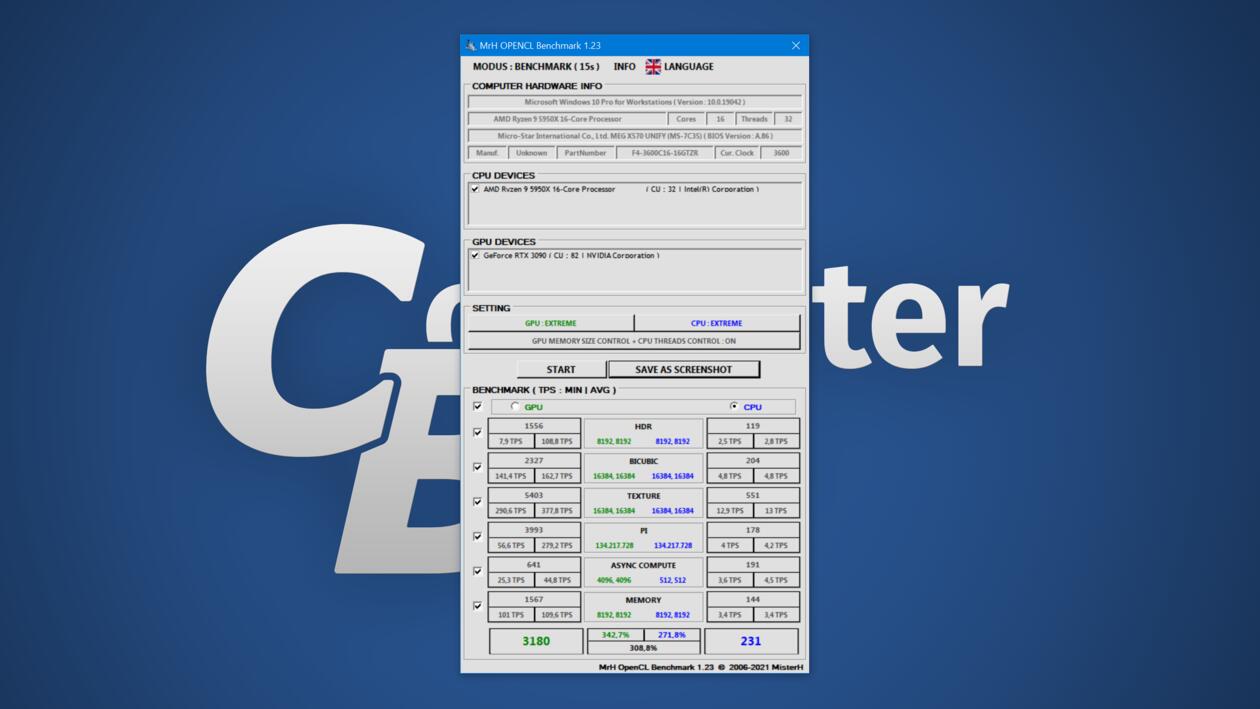

it requires LuxRays be compiled (tag: luxmark_v3.1)

It has exactly the same dependencies (i.e. LuxMark can be compiled exactly like LuxCoreRender. the sources are available here: (tag: luxmark_v3.1)
#OPENCL BENCHMARK TOOL INSTALL#
Windows 64bit: (note: you may have to install VisualStudio 2013 C++ runtime => ) a fix for OpenCL device with weird names ( ) a new command line -ext-info option ( ) CompuBench measures the compute performance of your OpenCL and CUDA device. "-cl-strict-aliasing" is not enabled by default because Intel compiler is broken and it doesn't support this standard option. By default, the following options are enabled: "-cl-fast-relaxed-math -cl-mad-enable -cl-no-signed-zeros". a new "OpenCL Compiler Options" menu in order to allow the user to enable/disable single compiler options. OpenCL "overclocking" (OpenCL C compiler options: -cl-fast-relaxed-math -cl-mad-enable -cl-no-signed-zeros) Because of the general score improvements in v3.1, it is not fair to compare LuxMark v3.0 results with LuxMark v3.1 Among other features, it includes some OpenCL optimization suggested by NVIDIA to LuxRender project.
#OPENCL BENCHMARK TOOL VERIFICATION#
ext-info (print scene and image verification too with -single-run) single-run (run the benchmark, print the result to the stdout and exit) STRESSTEST_OCL_CPUGPU|STRESSTEST_OCL_CPU|DEMO_LUXVR|PAUSE (select the mode to use) mode=BENCHMARK_OCL_GPU|BENCHMARK_OCL_CPUGPU|BENCHMARK_OCL_CPU|BENCHMARK_NATIVE|STRESSTEST_OCL_GPU| scene=LUXBALL_HDR|MICROPHONE|HOTEL (select the scene to use)

CLBenchmark compares the strengths and weaknesses of. It offers an unbiased way of testing and comparing the performance of implementations of OpenCL 1.1, a royalty-free standard for heterogenous parallel programming. The simple benchmark is the usual "LuxBall HDR" (217K triangles):Ĭommand line options Usage: luxmark CLBenchmark 1.1 Desktop Edition is an easy-to-use tool for comparing the computational performance of different platforms. It includes many new features compared the old results database.ģ brand new scenes are included. There is now a brand new web site dedicated to LuxMark result. LuxVR is included as demo too and replaces the old "Interactive" LuxMark mode. While it will still possible to submit fake results to the LuxMark result database, it will make this task harder. It has also a validation of the scene sources used (i.e. LuxMark now includes a validation of the rendered image by using the same technology used for pdiff in order to check if the benchmarked result is valid or something has gone wrong.
#OPENCL BENCHMARK TOOL CODE#
Ray intersection C++ code uses state-of-the-art Intel Embree.Īside from benchmarking modes, it is also available a stress mode to check the reliability of the hardware under heavy load. a render engine written only in C++ like in LuxMark v1.x). This release includes the come back of a benchmarking mode not requiring OpenCL (i.e. It is intended as a promotional tool for LuxCoreRender and it is now based on LuxCore API, the LuxCoreRender v2.x C++ or Python API available under Apache Licence v2.0 and freely usable in open source and commercial applications.Ī brand new micro-kernel based OpenCL path tracer is used as rendering mode for the benchmark. You can join the discussion on the MilOps Military Operations Benchmark on the OC3D Forums.LuxMark is a OpenCL cross-platform benchmark tool and has become, over past years, one of the most used (if not the most used) OpenCL benchmark. Graphics: NVidia GTX 970, AMD Radeon R9 280 (OpenGL 4.3, OpenCL 1.2, 4 GB VRAM, 4 TFLOP) Processor: Intel i5 Quad-core or equivalent Graphics: NVidia GTX 670, AMD Radeon HD 7950 (OpenGL 4.3, OpenCL 1.2, 3 GB VRAM, 2 TFLOP)Īdditional Notes: Intel Integrated Graphics not supported Requires a 64-bit processor and operating system Below are the benchmark's system requirements. The Military Operations Benchmark is currently available on Steam. Outside of the benchmark's profiling modes, the benchmark tool can also be used in an "interactive visualisation" mode, where users can roam the globe without limits and interact with individual units. Here supply lines will be just as important as the troops on the front lines, creating an in-depth strategic experience. In this game, players are expected to take control of large-scale, accurate maps and command their troops to victory amidst an ever-changing tactical situation. This benchmark version acts as a showcase of the game's engine and as an opportunity for the game's developers to receive feedback for their large-scale World War 2 RTS. Military Operations is an upcoming RTS game that is based on the Metis Engine, an engine which uses OpenCL to conduct background processing on both the player's CPU and GPU, facilitating a large-scale simulation where 50,000 individual troops can be simulated at once.


 0 kommentar(er)
0 kommentar(er)
